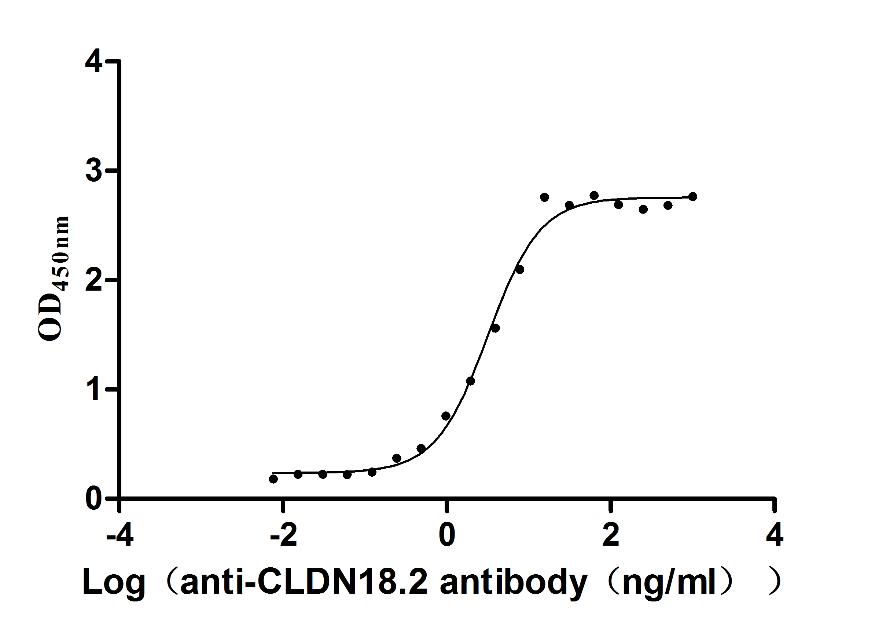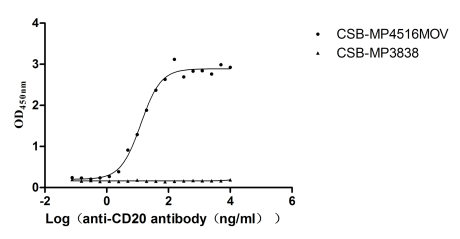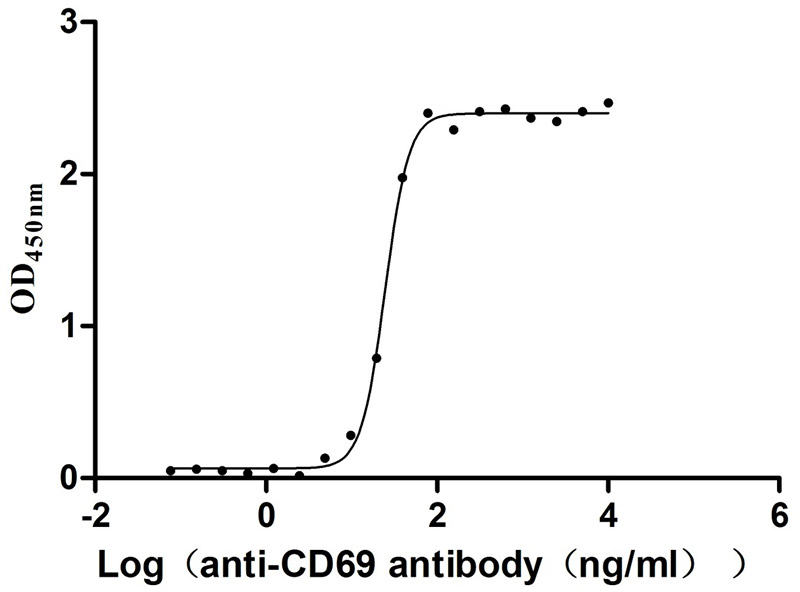Recombinant Mouse Muscarinic acetylcholine receptor M1 (Chrm1), partial
-
货号:CSB-YP005381MO1
-
规格:
-
来源:Yeast
-
其他:
-
货号:CSB-EP005381MO1
-
规格:
-
来源:E.coli
-
其他:
-
货号:CSB-EP005381MO1-B
-
规格:
-
来源:E.coli
-
共轭:Avi-tag Biotinylated
E. coli biotin ligase (BirA) is highly specific in covalently attaching biotin to the 15 amino acid AviTag peptide. This recombinant protein was biotinylated in vivo by AviTag-BirA technology, which method is BriA catalyzes amide linkage between the biotin and the specific lysine of the AviTag.
-
其他:
-
货号:CSB-BP005381MO1
-
规格:
-
来源:Baculovirus
-
其他:
-
货号:CSB-MP005381MO1
-
规格:
-
来源:Mammalian cell
-
其他:
产品详情
-
纯度:>85% (SDS-PAGE)
-
基因名:
-
Uniprot No.:
-
别名:Chrm1; Chrm-1; Muscarinic acetylcholine receptor M1
-
种属:Mus musculus (Mouse)
-
蛋白长度:Partial
-
蛋白标签:Tag type will be determined during the manufacturing process.
The tag type will be determined during production process. If you have specified tag type, please tell us and we will develop the specified tag preferentially. -
产品提供形式:Lyophilized powder
Note: We will preferentially ship the format that we have in stock, however, if you have any special requirement for the format, please remark your requirement when placing the order, we will prepare according to your demand. -
复溶:We recommend that this vial be briefly centrifuged prior to opening to bring the contents to the bottom. Please reconstitute protein in deionized sterile water to a concentration of 0.1-1.0 mg/mL.We recommend to add 5-50% of glycerol (final concentration) and aliquot for long-term storage at -20℃/-80℃. Our default final concentration of glycerol is 50%. Customers could use it as reference.
-
储存条件:Store at -20°C/-80°C upon receipt, aliquoting is necessary for mutiple use. Avoid repeated freeze-thaw cycles.
-
保质期:The shelf life is related to many factors, storage state, buffer ingredients, storage temperature and the stability of the protein itself.
Generally, the shelf life of liquid form is 6 months at -20°C/-80°C. The shelf life of lyophilized form is 12 months at -20°C/-80°C. -
货期:Delivery time may differ from different purchasing way or location, please kindly consult your local distributors for specific delivery time.Note: All of our proteins are default shipped with normal blue ice packs, if you request to ship with dry ice, please communicate with us in advance and extra fees will be charged.
-
注意事项:Repeated freezing and thawing is not recommended. Store working aliquots at 4°C for up to one week.
-
Datasheet :Please contact us to get it.
相关产品
靶点详情
-
功能:The muscarinic acetylcholine receptor mediates various cellular responses, including inhibition of adenylate cyclase, breakdown of phosphoinositides and modulation of potassium channels through the action of G proteins. Primary transducing effect is Pi turnover.
-
基因功能参考文献:
- Results indicate that direct inhibition of acetylcholinesterase activity and up-regulation of m1 muscarinic acetylcholine receptor expression in the striatum might contribute to the beneficial effects of alpha-asarone on locomotor hyperactivity in Fmr1 knock out mice. PMID: 27316341
- The three receptor sets considered (mAChR, AR and TrkB receptors) intervene in modulating the conditions of the competition between nerve endings. PMID: 27339059
- The memory deficits in mouse prion disease were completely restored by treatment with benzyl quinolone carboxylic acid (BQCA) and benzoquinazoline-12 (BQZ-12), two highly selective positive allosteric modulators (PAMs) of M1 mAChRs. Furthermore, prolonged exposure to BQCA markedly extended the lifespan of diseased mice. PMID: 27991860
- Data suggest that the inositol phosphate accumulation assay has utility for the evaluation of M1 muscarinic acetylcholine receptor activators in vivo. PMID: 27958713
- determining the phosphorylation status of the M1 mAChR at Ser(228) not only provides a means of establishing receptor activation following drug treatment both in vitro and in vivo but also allows for the mapping of the activation status of the M1 mAChR in the hippocampus PMID: 26826123
- This study showed that M1 receptor knockout mice have higher noradrenaline levels than that of the wildtype mice, in parallel to a decrease in IgG producing B cells. PMID: 26002586
- M1 Muscarinic Receptor Deficiency Attenuates Azoxymethane-Induced Chronic Liver Injury in Mice PMID: 26374068
- High M1 muscarinic receptor expression is associated with acute liver injury. PMID: 25452146
- This study demonistrated that Expression of m1-type muscarinic acetylcholine receptors by parvalbumin-immunoreactive neurons in the primary visual cortex PMID: 23983014
- The mm (chi(1) congruent with -60 degrees ; chi(2) congruent with -60 degrees ) and tp (chi(1) congruent with 180 degrees ; chi(2) congruent with +60 degrees ) rotamers were identified as the likely conduction-catalyzing conformations of the AChR's selectivity-filter glutamates. PMID: 25049389
- the M3 receptor has a pro-inflammatory role in cigarette smoke-induced neutrophilia and cytokine release, yet M1 and M2 receptors have an anti-inflammatory role PMID: 23397297
- The results of this study suggested that M1-muscarinic receptors promote fear memory consolidation via phospholipase C and the M-current. PMID: 24478341
- mAChRs in mouse colonic epithelial cells consist of two subtypes, M1 (80 %) and M3 (20 %); The M1 subtype was likely to regulate epithelial chloride secretion negatively and was susceptible to inflammation PMID: 23242454
- M1 receptor is co-localized with VGLUT2 on the intraganglionic laminar endings of esophagus. PMID: 23742744
- Downregulation of M1 muscarinic receptor in klotho mutant mice and inactivation of the JAK2/STAT3 signaling axis plays a critical role in cognitive impairment. PMID: 23389690
- In the prefrontal cortex, M1 receptor enhances cyclic AMP formation and signaling to the nucleus. PMID: 22456324
- Structural rearrangement analysis by FRET revealed that Gq coupling stabilizes the active conformation of muscarinic M1 receptor. PMID: 23085334
- M1-mAChRs function at both surface and intracellular sites in telencephalon neurons including the hippocampus PMID: 23678982
- a low concentration of N-methyl-d-aspartate causes long-lasting hippocampal cell damage and that endogenous acetylcholine plays, via muscarinic M(1) receptor, a rescuing role in the excitotoxicity-induced long-lasting hippocampal cell damage PMID: 23220711
- These data suggest that M1R(-/-) mice display abnormal responding in the face of relatively preserved attention, learning and perception. PMID: 21903112
- Data show that CFP/YFP-M(1) mAChR chimera expressed predominantly at the plasma membrane . PMID: 22272263
- disrupting the M(1)R plays a role in exacerbating Alzheimer's disease-related cognitive decline and pathological features PMID: 21704011
- the P2X7R-Panx1 complex may play an important role as a negative modulator of M1 receptor-mediated seizure activity in vivo PMID: 21505260
- We therefore conclude that M1 and M4 receptors are the major mAChR subtypes responsible for direct cholinergic modulation of the excitatory hippocampal circuit. PMID: 21160001
- The gating rate and equilibrium constants for receptors with point mutations of alpha-subunit residues located between the binding sites and the membrane domain. PMID: 20682257
- The results of this study indicated that the M1 mAChR is an important regulator of amyloidogenesis in the brain and provide strong support for targeting the M1 mAChR as a therapeutic candidate in Alzheimer disease. PMID: 20335454
- Muscarinic M1 receptor is so positioned in the cortex as to sense ambient ACh released from cholinergic terminals at variable distances and to enhance the synaptic efficacy and excitability of pyramidal cells. PMID: 20335477
- Our data provide important insight into the molecular basis of gamma oscillations by unequivocally establishing a novel role for muscarinic modulation of I(h) and I(cat) in rhythmic network activity. PMID: 11856534
- activation on sympathetic postganglionic cells results in catecholamine-mediated cardiac stimulation PMID: 11907166
- Just 15% of the M1 receptors in mouse hippocampus was required for maximal binding of oxotremorine-M-stimulated GTP-gamma-35S, suggesting that the M1 receptor is the primary G(alpha)(q)/11-coupled muscarinic receptor in mouse cerebrum. PMID: 12106668
- Muscarinic receptors are the predominant receptor mediating contractile responses in female mouse urinary bladder smooth muscle, with strain differences. PMID: 12359634
- The presence of muscarinic M1 receptor-mediated relaxation in the stomach fundus supports the neuronal localization of a muscarinic M1 receptor that activates nitric oxide release to effect relaxation. PMID: 12538821
- The M1 mAChRs modulate neurotransmitter signaling in cortex and hippocampus. Review. PMID: 12675128
- Muscarinic M1 receptors activate phosphoinositide hydrolysis in cortex and hippocampus of mice, consistent with the role of M1 receptors in cognition. Muscarinic M1 receptors appear to be the only muscarinic receptor subtype mediating seizures. PMID: 12713643
- RGS2 binds directly to the third intracellular (i3) loop of the G(q/11)-coupled M1 muscarinic cholinergic receptor (M1 mAChR; M1i3). PMID: 14976183
- M1 muscarinic receptors selectively modulate CaV1.3 in striatal medium spiny neurons. PMID: 15689540
- In gastric chief cells a mixture of M1 and M3 receptors mediates cholinergic stimulation of pepsinogen secretion and no other muscarinic receptor subtypes are involved in this activity PMID: 15933222
- KCNQ channel currents in striatal medium spiny neurons were potently reduced by M1 muscarinic receptors. PMID: 16093396
- agrin and perlecan cluster with laminin-2 to contribute to assembly of aneural AChR clusters that precede neural agrin release as well as affect later NMJ development PMID: 16219760
- Physiologically released acetylcholine from cholinergic fibers modulates hippocampal synaptic plasticity through the postsynaptic M1 mAChR activation. PMID: 16319319
- The afterdepolarization in stratum oriens-lacunosum moleculare cells, mediated by M1/M3 receptors, was associated with inhibition of an M current, a slow calcium-activated potassium current, and a calcium-dependent non-selective cationic current PMID: 16322052
- Data show that cocaine-induced status epilepticus and lethality produces differential changes in brain muscarinic M(1)and dopaminergic D1 and 2 receptors, depending on the brain area studied. PMID: 16633898
- can trigger glandular secretions. PMID: 17192665
- Results suggest that M1 and M5 muscarinic cholinergic receptors are not involved in anti-viral immunity. PMID: 17286988
- The decreased pituitary-adrenal sensitivity to oxotremorine and restraint stress noted in M(1) knockout mice is consistent with M(1) being primarily a postsynaptic receptor. PMID: 18363805
- the decrease in ACh-induced relaxation following perinatal hypoxia, suggesting that M(1)AChR-mediated alteration of ACh-induced relaxation is due to the activation of calcium-dependent PDE1. PMID: 18469116
- It is concluded that M1 muscarinic receptors may play a time-dependent role in the consolidation of reward-related memory of morphine. PMID: 18502314
- results demonstrate that M1 receptors facilitate cue detection behaviors and are both necessary and sufficient for most direct effects of ACh on pyramidal neuron excitability PMID: 19657040
- dysfunction of mAChRs might be a substantial basis for the progressive neurological deterioration in mice with double knockout of GD2 and GD3 synthase. PMID: 19744524
显示更多
收起更多
-
亚细胞定位:Cell membrane; Multi-pass membrane protein. Cell junction, synapse, postsynaptic cell membrane; Multi-pass membrane protein.
-
蛋白家族:G-protein coupled receptor 1 family, Muscarinic acetylcholine receptor subfamily, CHRM1 sub-subfamily
-
数据库链接:
KEGG: mmu:12669
STRING: 10090.ENSMUSP00000042632
UniGene: Mm.240607
Most popular with customers
-
Recombinant Mouse Tyrosine-protein kinase Mer (Mertk), partial (Active)
Express system: Mammalian cell
Species: Mus musculus (Mouse)
-
Recombinant Macaca fascicularis Claudin (CLDN18)-VLPs (Active)
Express system: Mammalian cell
Species: Macaca fascicularis (Crab-eating macaque) (Cynomolgus monkey)
-
Recombinant Human Interleukin-17A (IL17A) (T26A) (Active)
Express system: Baculovirus
Species: Homo sapiens (Human)
-
Recombinant Macaca fascicularis Membrane spanning 4-domains A1 (MS4A1)-VLPs (Active)
Express system: Mammalian cell
Species: Macaca fascicularis (Crab-eating macaque) (Cynomolgus monkey)
-
Recombinant Human Early activation antigen CD69 (CD69), partial (Active)
Express system: Mammalian cell
Species: Homo sapiens (Human)




-AC1.jpg)












